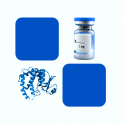
- Remove this product from my favorite's list.
- Add this product to my list of favorites.
Products
Newsletter
 |  |  |  |  |  |

Background
B7-1 and B7-2, together with their receptors CD28 and CTLA4, constitute one of the dominant co-stimulatory pathways that regulate T and Bcell responses. Although both CTLA4 and CD28 can bind to the same ligands, CTLA4 binds to B71 and B72 with a 20 100 fold higher affinity than CD28 and is involved in the downregulation of the immune response. B-lymphocyte activation antigen B7-1 (referred to as B7) also known as cluster of Differentiation 80 (CD80), is a member of cell surface immunoglobulin superfamily and is expressed on activated B cells, activated T cells, macrophages and dendritic cells. It is the ligand for two different proteins on the T cell surface: CD28 (for autoregulation and intercellular association) and CTLA-4 (for attenuation of regulation and cellular disassociation). CD80 works in tandem with CD86 to prime T cells. CD80 plays a role in induction of innate immune responses by activating NF-κB-signaling pathway in macrophages. CD80 is thus regarded as promising therapeutic targets for autoimmune diseases and various carcinomas.
Source
Recombinant Biotinylated Human B7-1, Fc,Avitag (B71-H82F2) is expressed from human 293 cells (HEK293). It contains AA Val 35 - Asn 242 (Accession # NP_005182.1).
Predicted N-terminus: Val 35
Molecular Characterization
This protein carries a human IgG1 Fc tag at the C-terminus, followed by an Avi tag (Avitag™).
The protein has a calculated MW of 52.3 kDa. As a result of glycosylation, the protein migrates as 65-95 kDa under reducing (R) condition, and 130-160 kDa under non-reducing (NR) condition (SDS-PAGE).
Biotinylation
Biotinylation of this product is performed using Avitag™ technology. Briefly, the single lysine residue in the Avitag is enzymatically labeled with biotin.
Biotin:Protein Ratio
Passed as determined by the HABA assay / binding ELISA.
Endotoxin
Less than 1.0 EU per μg by the LAL method.
Purity
>95% as determined by SDS-PAGE.
Formulation
Lyophilized from 0.22 μm filtered solution in Tris with Glycine, Arginine and NaCl, pH7.5. Normally trehalose is added as protectant before lyophilization.
Reconstitution
Please see Certificate of Analysis for specific instructions.
For best performance, we strongly recommend you to follow the reconstitution protocol provided in the CoA.
Storage
For long term storage, the product should be stored at lyophilized state at -20°C or lower.
Please avoid repeated freeze-thaw cycles.
This product is stable after storage at:
-20°C to -70°C for 12 months in lyophilized state;
-70°C for 3 months under sterile conditions after reconstitution.
Bioactivity
Please refer to product data sheet.
(1) "Design of a novel multiepitope vaccine with CTLA-4 extracellular domain against Mycoplasma pneumoniae: A vaccine-immunoinformatics approach"
Pan, Guo, Shi
Vaccine (2024)
(2) "PD-1/CD80+ small extracellular vesicles from immunocytes induce cold tumours featured with enhanced adaptive immunosuppression"
Zhang, Yang, Chen et al
Nat Commun (2024) 15 (1), 3884
(3) "CD80 on skin stem cells promotes local expansion of regulatory T cells upon injury to orchestrate repair within an inflammatory environment"
Luan, Truong, Vuchkovska et al
Immunity (2024) 57 (5), 1071-1086.e7
Showing 1-3 of 6145 papers.
Follow us